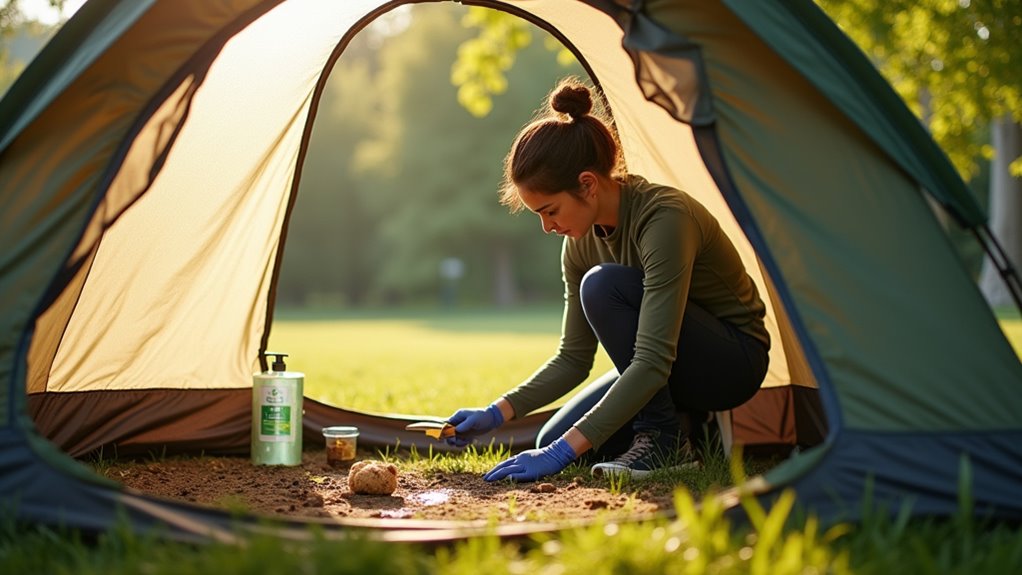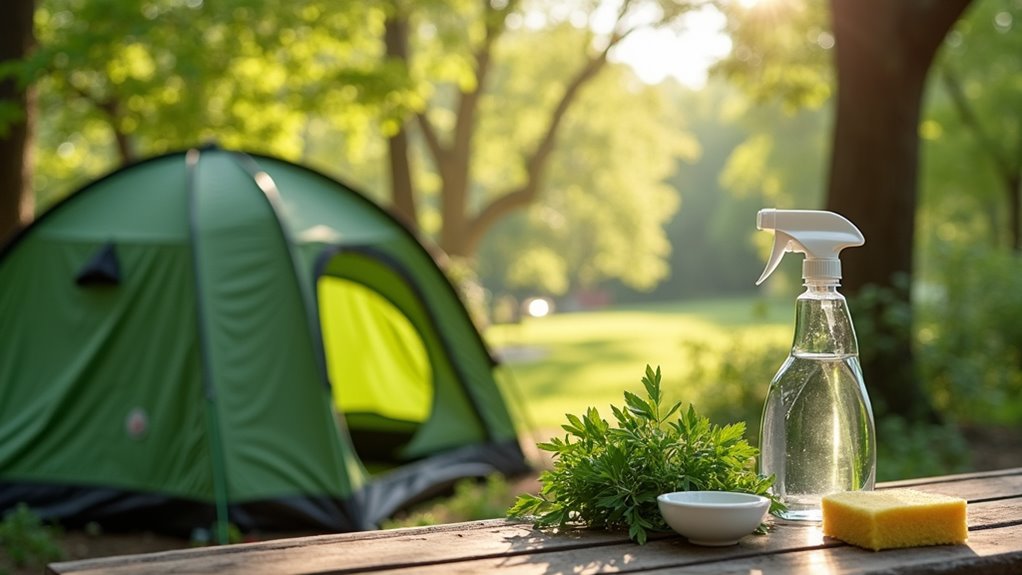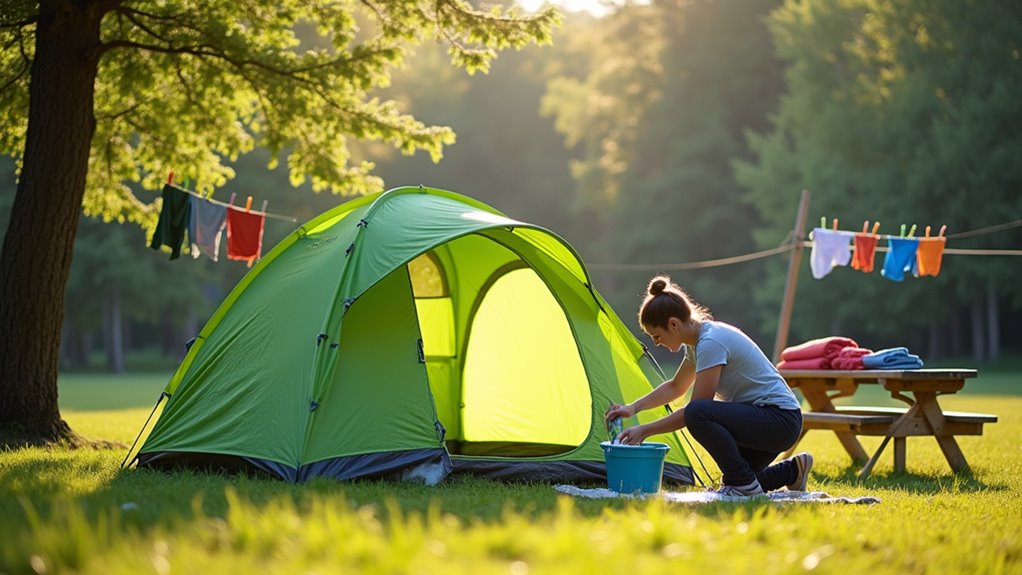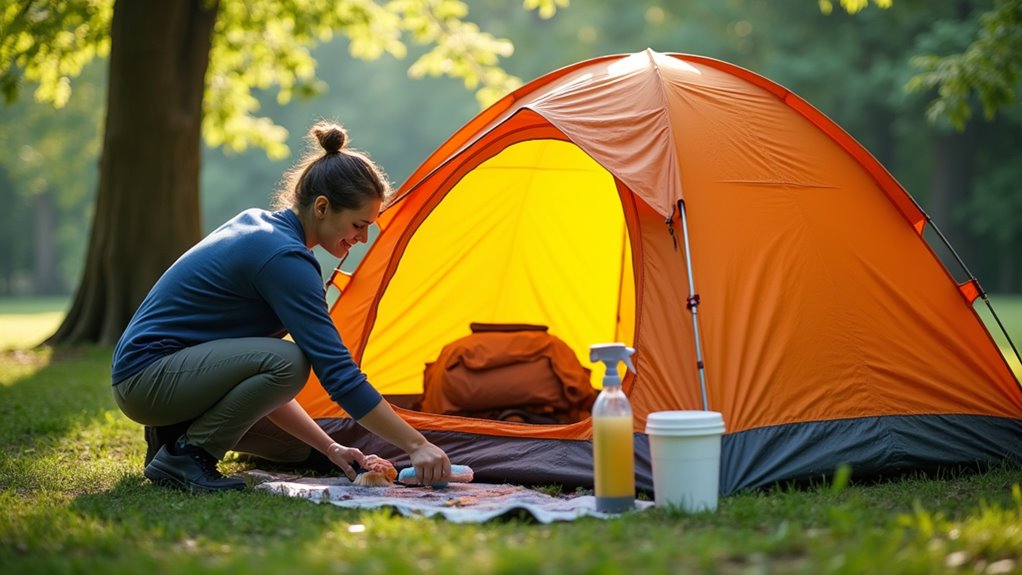How To Clean A Tent That Smells
This post contains affiliate links. As an Amazon Associate, we earn from qualifying purchases.
To clean a tent that smells, use warm water with mild soap to scrub the affected areas, especially seams where moisture collects, and treat stubborn odors with a vinegar solution or an enzyme cleaner like Revivex. After washing, dry the tent thoroughly in a shaded, well-ventilated area to prevent mold growth. Further details and tips for maintaining a fresh tent will be explained in the following sections.
Essential Facts in 30 Seconds
- Check the tent for dampness, mold, or mildew, especially around seams and fabric.
- Clean using warm water and mild soap with a soft brush on affected areas.
- Use a vinegar and water soak or apply baking soda to remove strong odors.
- Dry the tent fully in a shaded, well-ventilated area to avoid mold.
- Air out the tent regularly and store it in a cool, dry place to keep it fresh.
Identifying the Source of Odors

Cleaning your tent starts with finding the source of bad smells. Dampness causes mold, which gives a strong musty odor. Check fabric and seams by smelling closely to find wet spots. A thorough cleaning process can help eliminate these odors effectively.
Dirt, sweat, and body odors also build up inside the tent. Poor airflow makes these smells worse. Mildew shows as tiny cross-shaped spots and means the tent didn’t dry well.
Old tents can smell like chemicals due to the breakdown of their coatings. Catching these smells early helps you clean better and keep your tent fresh. Act fast to stop smells before they get worse. Regular maintenance can help prevent future mildew growth.
Cleaning Methods for Effective Odor Removal
Identify the source of odors in your tent first.
Clean the tent using warm water and mild dish soap or castile soap. Use a soft brush to scrub dirty spots gently. Avoid harsh chemicals that can ruin fabric and waterproof coatings. Regularly inspecting your tent for damage or tears can also help prevent odors from forming.
Machine wash only with a detergent made for waterproof fabrics and select a gentle cycle. Let your tent dry fully in fresh air; don’t use heat sources like dryers or heaters.
For strong smells, soak the fabric in a mix of vinegar and water or apply vinegar with baking soda. Regular maintenance of your tent will help keep it smelling fresh and extend its lifespan.
Store your tent in breathable bags to keep it fresh. Use odor absorbers like white vinegar during storage.
Regular cleaning keeps your tent smelling clean and ready for your next trip.
Utilizing Microbial Odor Eliminators

Microbial odor eliminators make tent cleaning easier and better.
Products like Revivex and MiraZyme use water-activated microbes. These microbes kill bacteria that cause bad smells.
Use the product as the instructions say. This keeps your gear fresh and stops mold and mildew from growing.
Many campers trust these products for a clean, odor-free tent. Your tent will smell fresh and last longer.
Simple steps. Big results.
Benefits of Microbial Solutions
Microbial odor eliminators fight bad smells in tents and outdoor gear safely.
These products use helpful microbes that eat the bacteria causing odors. They don’t just hide smells; they remove them.
These microbes are non-toxic and safe for the environment. They keep working long after you apply them, so odors stay away for a long time.
Use them on tents, sleeping bags, and more. They help keep nature balanced by reducing the need for strong chemicals.
This makes them a smart and affordable way to keep your gear fresh.
Application Process Explained
Eliminate odors from your tent with a simple step-by-step process.
Open all flaps and zippers to expose the fabric fully.
Fill a large tub with warm water and add 1 fl oz of microbial solution, such as Revivex or Bio one™.
Submerge the tent quickly for 5 to 20 minutes to let the microbes soak in.
Don’t rinse the tent afterward. This keeps the microbes active as the tent dries.
Air dry the tent in a shaded spot. Sunlight and heat can kill the helpful microbes.
This method cleans the tent and stops odors from returning. It works well and keeps your tent fresh for many trips.
Household Remedies for Mildew and Stubborn Smells
Mildew and bad smells in tents need quick action. Use simple household items to fix these problems safely. White vinegar fights mildew well. Mix one part vinegar with three parts water. Spray this on the mildew spots and let the tent dry in fresh air. Regular cleaning helps prevent future mold growth.
Lemon juice and salt make a strong paste. Rub it on stains and wait until it dries. Ensure you scrub gently to avoid damaging the fabric of your tent.
Enzyme cleaners work great for tough smells. Soak the tent in enzyme cleaner for 30 minutes to remove odors deeply. Always follow the product instructions for the best results.
Keep your tent dry to stop mildew. Set it outdoors in the sun, open all sides, and use a fan if possible. Good airflow stops moisture that causes mildew and prevents mold growth. Proper storage methods further help in maintaining your tent’s condition.
These easy steps keep your tent fresh and last longer. No harsh chemicals needed. Clean, dry, and fresh—your tent will thank you!
Washing and Drying Best Practices

Hand wash your tent to keep its waterproof coating safe. Use warm water and mild soap made for tents. Avoid household cleaners, as they can damage the fabric. Make sure to inspect the tent for damage before washing to ensure it remains in good condition. Regular cleaning helps prevent mold growth and bad smells from forming. Dry your tent fully by hanging it in shade with good air flow. This stops mold and bad smells from forming. Proper care helps your tent last longer and stay strong.
Hand Washing Techniques
Cleaning your tent by hand helps keep it strong and waterproof. Use a mild soap like Dr. Bronner’s Castile Liquid Soap or Grangers® Tent + Gear Wash. Avoid soaps with fragrances or softeners because they can damage the fabric.
Fill a bathtub or bucket with warm water. Add a small amount of soap and mix gently. Soak the tent carefully and use a soft brush to clean dirty spots. Don’t scrub too hard; it can hurt the fabric. Removing mold can also be an important step in maintaining your tent’s condition.
Rinse the tent well with clean water to remove all soap. This keeps your tent ready for your next trip.
Clean tents last longer and stay waterproof better. Simple steps make a big difference.
Proper Drying Methods
After washing your tent by hand, dry it carefully to keep it strong and useful.
Find a clean place with good air flow. Keep the tent out of direct sunlight to avoid damage. Lay the tent flat or hang it over poles. Make sure all corners and seams get air.
Use a big mop or squeegee to remove extra water before hanging. Use drying racks that hold heavy items to stop the tent from sagging. Let air move around the fabric. Avoid strong winds that can harm the tent.
Check the tent for wet spots. If needed, dry it again in a warm, airy place. Only store the tent once it feels fully dry. This way, your tent stays in good shape for your next trip.
Waterproofing Restoration Steps
Restore your tent’s waterproofing with simple, careful steps. Use mild soaps like Woolite that don’t harm the fabric’s coating. Avoid harsh chemicals that break down waterproof layers.
Set up your tent or fill a tub with lukewarm water. Gently soak the fabric without scrubbing hard. Rinse the tent several times to remove all soap. Soap left behind can stop water from beading off.
After cleaning, apply a fresh waterproof treatment. Older tents especially need this to keep water out. It’s important to remember that higher ratings indicate better water resistance, so consider the tent’s specifications when choosing a treatment. These steps help keep your tent dry and ready for use.
Specialized Tips for Tackling Tough Odors

Tough tent odors need a smart plan. First, open all zippers, doors, and windows to air out your tent.
Use an enzyme-based odor remover like Revivex to fight bad smells. This product breaks down bacteria that cause odors instead of just covering them up. Soak your tent in a mix of this product and water for five minutes. Don’t rinse afterward to keep the good bacteria working.
Smells from old polyurethane coatings need warm, soapy water. Let the tent soak for 2-3 hours.
For strong odors, mix isopropyl alcohol, water, and mild soap. Gently scrub the smelly spots with this mix. Let the tent dry fully in the shade or indirect sunlight. This helps stop smells and keeps the microbes active.
Stay fresh and enjoy your camping!
Frequently Asked Questions
How Often Should I Clean My Tent to Prevent Odors?
Clean your tent often to keep it smelling fresh. After every trip, wash your tent well. This stops mold and bad smells from building up. In wet places, clean it right away. Let your tent dry fully before packing it away. This prevents dampness and odor. A clean tent lasts longer and feels nicer inside. Regular care saves money and hassle later. Keep your tent fresh for every adventure.
Can I Use Bleach on My Tent for Odor Removal?
Bleach can harm your tent fabric and its waterproof coating. It breaks down the material and makes it weak. This damage lets water in and ruins the tent’s life. Use mild soap and water to clean odors safely. Baking soda or vinegar also work well to remove smells. These options keep your tent strong and fresh. Avoid bleach to protect your gear and stay dry.
What Are Signs My Tent Needs Replacement Due to Odors?
Persistent bad smells after cleaning mean trouble. Check your tent fabric closely. Mold spots or fabric tears cause odors. Stains and loose seams often hide the smell source. These signs show your tent needs replacing soon. Don’t wait. A fresh tent keeps camping fun and safe.
Can I Machine Wash My Tent Without Damaging It?
Machine washing a tent often causes damage. The fabric and seams can tear or weaken. Dirt and stains need gentle cleaning. Use a soft brush and mild soap instead. Rinse well with clean water. Dry the tent fully in shade to avoid sun damage. This care keeps your tent strong and lasting for many trips. Treat it gently to protect your gear and stay safe outdoors.
How Can I Prevent Odors From Developing During Storage?
Prevent odors by drying the tent fully before storing. Keep the tent in a cool, airy place. Use bags that let air pass through, like cotton or mesh. Avoid storing tents in damp or humid spots. Check the tent often for any signs of moisture. Dry tents stop mold and bad smells from growing. This simple care keeps your tent fresh for the next trip.
Conclusion
Cleaning your tent to remove bad smells is simple and effective. Use special odor removers like OdorKlenz or common items like vinegar and baking soda. These help kill the germs causing the smell. Wash your tent gently by hand or with a soft brush. Avoid harsh scrubbing to protect the fabric. Let your tent dry fully in the sun to stop mold and mildew. These steps make your tent fresh and ready for your next trip. Say goodbye to bad odors and enjoy camping with a clean tent.
